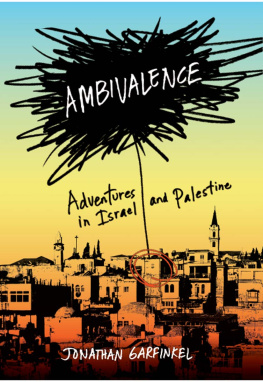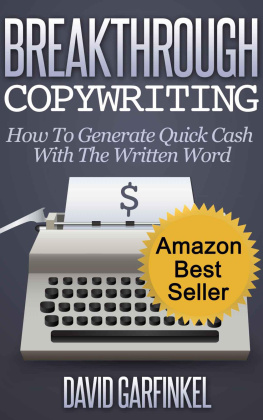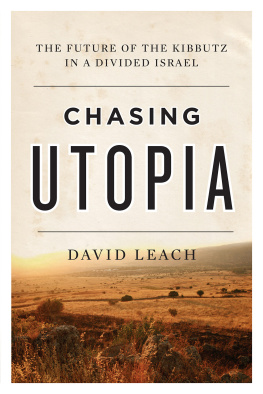AMBIVALENCE
ADVENTURES IN ISRAEL AND PALESTINE
JONATHAN GARFINKEL

W. W. NORTON & COMPANY
New York London
Copyright 2007 by Jonathan Garfinkel
First published in Canada under the title
Ambivalence: Crossing the Israel/Palestine Divide
All rights reserved
Excerpts from Lecha Dodi and Aleinu are reproduced from The Complete ArtScroll Siddur , with permission of the copyright holders, ArtScroll/Mesorah Publications, Ltd.
Yerushalaim Shel-Zahav (Jerusalem of Gold) words and music by NAOMI SHEMER-SAPIR 1967 (Renewed) CHAPPELL & CO ., LTD. (LONDON ). All rights on behalf of CHAPPELL & CO., LTD. (LONDON ) administered by CHAPPELL & CO . All rights reserved. Used by permission of ALFRED PUBLISHING CO ., INC .
For information about permission to reproduce selections from this book, write to Permissions, W. W. Norton & Company, Inc., 500 Fifth Avenue, New York, NY 10110
Library of Congress Cataloging-in-Publication Data
Garfinkel, Jonathan.
Ambivalence: adventures in Israel and Palestine / Jonathan Garfinkel.1st American ed.
p. cm.
ISBN: 978-0-393-06966-2
1. Garfinkel, JonathanTravelIsrael. 2. IsraelDescription and travel. 3. JewsOntarioTorontoBiography. 4. Toronto (Ont.)Biography. I. Title.
DS107.5.G38 2008956.9405'4092dc22[B]
2008006167
W. W. Norton & Company, Inc.
500 Fifth Avenue, New York, N.Y. 10110
www.wwnorton.com
W. W. Norton & Company Ltd.
Castle House, 75/76 Wells Street, London W1T 3QT
For my parents,
Paul and Dorothy
Sing to me, dear bird,
of miracles far away.
Tell me, is there much evil there, and pain too
in that land of warmth and beauty?
C.N. BIALIK, TO THE BIRD
Contents
Prologue
Whats your fathers name?
I mumble something.
Open your bag, sir.
The security official rifles through my stuff. I dont know why I dont say my fathers real name. I dont tell them my religion, if I pray, what I believe in. Dont say a thing.
Whats the purpose of your trip?
Tourist.
Clothes are removed from my suitcase. Empty notebooks. A letter from my dead grandfather, folded three times. A yellow Duo-Tang. The cover is a pasted-on magazine photo of the Dome of the Rock, golden skin shining beneath the fluorescent lights of Ben-Gurion Airport, Tel Aviv. On thin yellow cardboard, thick Hebrew letters: Yerushalayim . Jerusalem. A place Ive never set foot in.
The security official thumbs through the notebook. The pages are written in Hebrew.
Why didnt you just say so? she asks.
I shrug my shoulders. Think: Id like to enter this place without tribe, history, identity. The idea is ridiculous. I mean, look where I am.
Nows not the best time to be visiting, you know, she says.
Isnt it always a good time to visit the Holy Land?
DEPARTURES
I have to return to the witness that I am. And first of all, to the Jew that I was.
JEAN DANIEL, THE JEWISH PRISON
CHAPTER 1
Several years earlier
Kensington Market, Toronto
From the wooden benches we rise, shuffling, dutifully turning 180 degrees to face the back wall of the synagogue. Normally we face east toward Jerusalem, but for this verse were praying west. Like a drunken geriatric choir we welcome the Sabbath Bride.
Lecha dodi, likrat kala
Pnai Shabbat nekabla
Come my beloved to meet the bride,
let us welcome the Sabbath
There are only fourteen men here tonight, but we belt out the song anyway.
Theres Yakov on the bimah leading the way. Hes a dentist by day and folksinger by night. Hes gone grey and mid-life, talks bitter, a sarcastic jab to the ribs, but when he sings its gold and you can glimpse an inkling of his soul.
Old Yankl, hes a lion with a mane of white hair, dry and saint-like. He has pale, pockmarked skin. Standing next to me with his open prayer book, his thin blue cat-eyes stare at the red-stained glass above the womens section. He watches the shadow of a pigeon on the landing behind the window. Yankl likes to pray, drink Alberta rye and play the track. Rumour has it he lives in the Waverly Hotel, has since Milton Acorn days.
Next to Yankl is his best friend, the Engineer, droning out something that resembles a bass line. He used to be a whiz of a physicist at the University of Chicago. No one knows where he lives or what he does now; the story goes he lives on the streets. Sometimes I see him in the Lillian Smith Library scribbling in his notebook. Hes working on his magnum opus, a book about the relation between quantum mechanics and aged cheddar cheese. The guys splitting a green suit three sizes too small. The sleeves come up to his elbows, the pants to his shins, and his large belly hangs over a cardboard belt. I look like a shlump, I once heard the Engineer say, because thats what the world does to the poor: turns them into shlumps. And, shlump to shlump, you may notice that this once-beautiful Harry Rosen silk suitwhich I purposefully washed in the washing machine to get it wrinkly and smallis the suit of Satan.
Behind me to the right is G., a real pretty choirboys tenor. He used to be a woman. After a years supply of testosterone pills and OHIP-assisted surgery, G. joined the mens section at the Anshei Minsk. He wears thick black glasses and has a black beard I envy. I dont think that anybody at the synagogue knows G. was born a woman except for me. He confided this to me one Yom Kippur.
Jonathan, he said in a voice that cracked at the Jona and found itself again at the thin, I used to be a lesbian. He brushed his beard with his hand as though it were a lint brush and his beard an expensive jacket.
I thought he was joking, using that tiresome pickup line Id heard once at a college frat party. But G. is no frat boy (although he has confessed his attraction to their barbaric, tribalistic rituals). As we sat on the park bench next to the Al Waxman statue in Kensington Market, G. showed me an old Ontario drivers licence. Her name was Alexis Wallace. She had angel black hair and Emily Watson eyes.
You used to be a shiksa, I said. He didnt find that funny.
Its not my fault my mother didnt tell me she was Jewish until four years ago, he said.
G., I said, realizing what he needed was a friend, confidant, brother, mazel tov.
He was talking to me because of my ambivalent relationship to Judaism. Like G., I both love and reject my faith. I simultaneously crave the postmodern and worship the ancient.
G. and I sat on the bench while pigeons landed and shat on Al Waxmans head. A couple of teenagers stoned on mouthwash and nutmeg played ding the empty beer with stones. I surreptitiously examined the package between G.s legs to glean just how good the operation was. Fasting does strange things to the head. Did he have a bris? Was his mother there with bowls of chopped liver and pickled herring? It is, after all, an occasion of joy when a Jewish male is welcomed into the fold. When I was at my brother Josephs bris (I was six) I could not take my eyes off the mohels steady hand, stared at the towel dipped in wine to sedate my baby brother. The curious precision of the mohel who wore not hospital white but a lovely navy-blue pinstripe suit. In two deft snips, my brothers covenant was sealed. Then we moved to the dining room, to stuff our faces with chopped egg, poppy seed bagels, cheese blintzes and lox.
I TURN TO MY prayer book and join the other men in song.
Lecha dodi, lecha dodi likrat kala
Pnai Shabbat nekabla
When I sing Lecha Dodi, I think maybe its easier this way, not to fight what I was given, the world I was handed on day eight of my life with a snip snip of the tip tip. But Lecha Dodi is more than inheritance and duty. The music makes me feel cleaner. I sing it and lose all skepticism, stupidity, desire for the outside raciness of things. That is, until I look at the translation.












